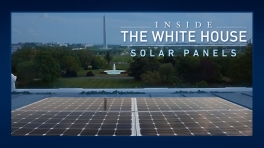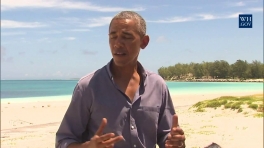Learn: Climate Change
A New Foundation | Going Green | Get Involved | Learn | Share
Progress So Far
Monitoring Emissions: For the first time, the U.S. will catalogue greenhouse gas emissions from large emission sources – an important initial step toward measurable and transparent reductions.
Efficiency Standard for Cars and Trucks: President Obama announced the first ever joint fuel economy/greenhouse gas emissions standards for cars and trucks in May 2009. The new standards are projected to save 1.8 billion barrels of oil over the life of the program with a fuel economy gain averaging more than 5 percent per year and a reduction of approximately 900 million metric tons in greenhouse gas emissions.
Climate Change Adaptation: In 2009, the White House Council on Environmental Quality (CEQ), the Office of Science and Technology Policy (OSTP), and the National Oceanic and Atmospheric Administration (NOAA) initiated the Interagency Climate Change Adaptation Task Force, which includes representatives from more than 20 Federal Agencies. When the President signed the Executive Order on Federal Leadership in Environmental, Energy, and Economic Performance, on October 5, 2009, he called on the Task Force to develop, within one year, Federal recommendations for adapting to climate change impacts both domestically and internationally.
International Leadership: For the first time in American history, our country changed course this year and chose to lead in international climate negotiations. Under President Obama’s leadership, the international community has taken significant measures toward a global solution to climate change, including reinvigorating the Major Economies Forum (MEF); eliminating fossil fuel subsidies; fostering bilateral energy and climate partnerships with China, India, Mexico, Canada and others; phasing down HFCs (Hydrofluorcarbons); and reaching an historic accord at the Copenhagen climate summit that maintains progress toward an international agreement that will ensure a prosperous and secure future for our children and grandchildren.
Making Homes More Energy Efficient: In May 2009, the Vice President asked the White House Council on Environmental Quality (CEQ) to develop a proposal for Federal action to lay the groundwork for a self-sustaining home energy efficiency retrofit industry. In response, CEQ facilitated a broad interagency process with the Office of the Vice President, eleven Departments and Agencies and six White House Offices to develop recommendations. These recommendations are described in detail in the Recovery Through Retrofit Report, released on October 19, 2009. The Report’s recommendations were carefully crafted to use existing authority and existing funding to stimulate a national home energy retrofit market.
Recovery Through Retrofit will eliminate key barriers in the home retrofit industry by providing consumers with access to straightforward information about their home’s energy use, promoting innovative financing options to reduce upfront costs, and developing national standards to ensure that workers are qualified and consumers benefit from home retrofits.
Climate Change Science and Education: The U.S. Global Change Research Program, a collaborative effort involving 13 Federal Agencies, works to understand and respond to climate change as part of a government-wide effort to reduce U.S. greenhouse gas emissions and grow a clean energy economy. USGCRP’s guide, Climate Literacy: The Essential Principles of Climate Science, explains in plain English the principles and concepts fundamental to climate literacy, and Climate Change, Wildlife and Wildlands: Toolkit for Formal and Informal Educators provides useful resources for educators.


